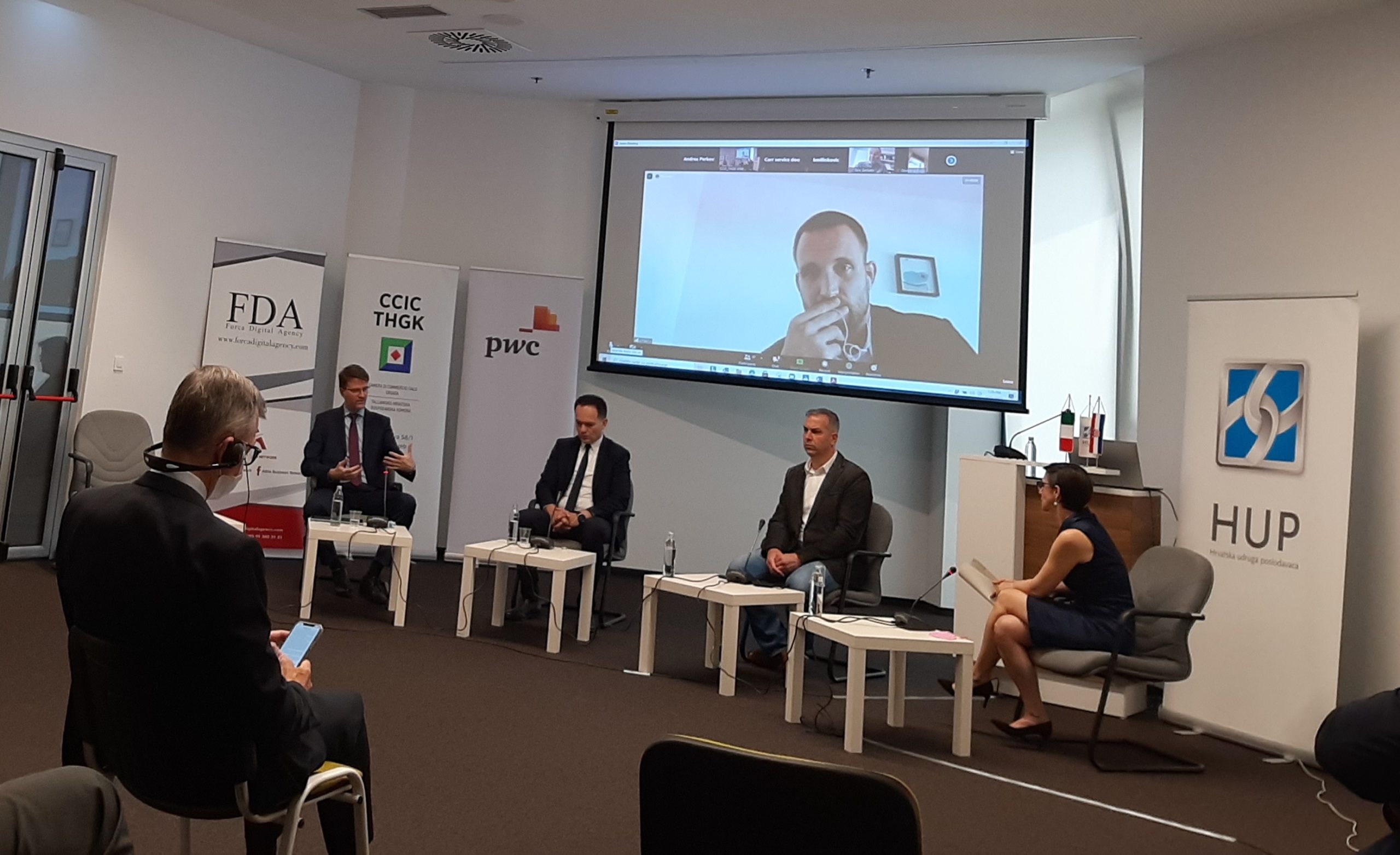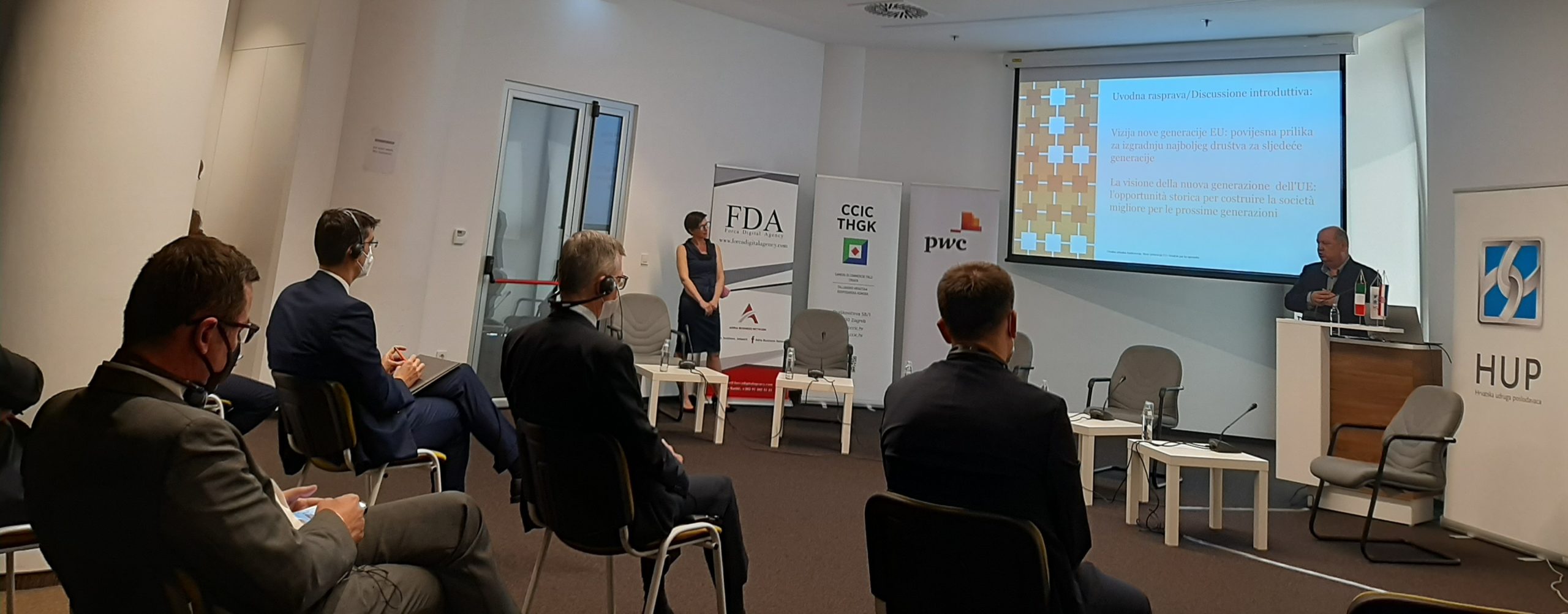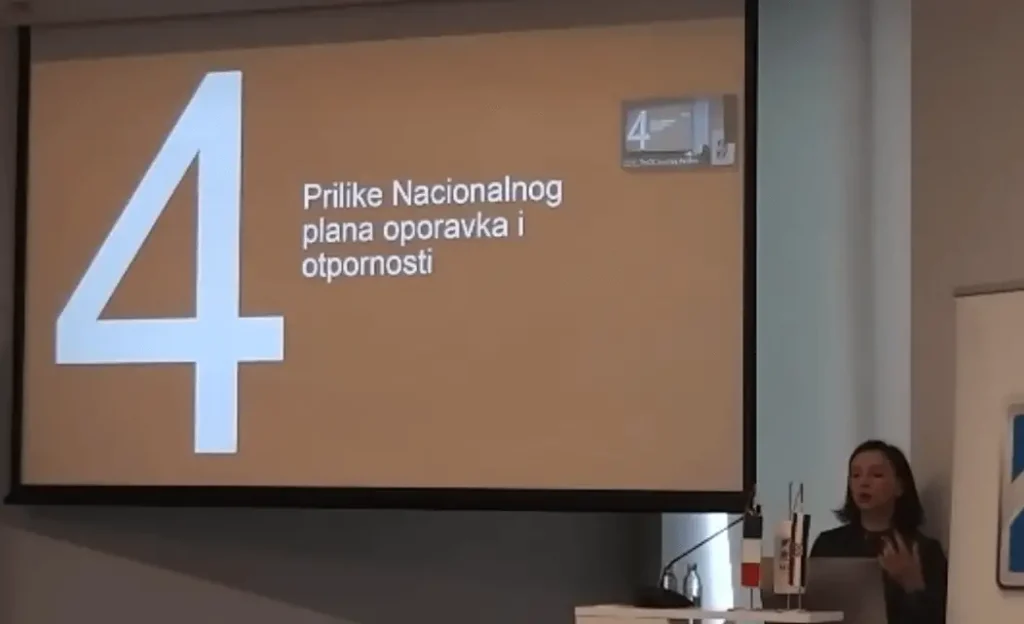The National Recovery and Resilience Plan with EU funds is expected to be a real lever for growth, recovery, and resilience to future crises.
Under the auspices of the Ministry of Regional Development and European Union Funds and with the support of the Ministry of European and Foreign Affairs and the Italian Embassy in Zagreb, the Italian-Croatian Chamber of Commerce and Forca Digital Agency, in cooperation with PwC Croatia, organized an introductory hybrid conference at the Croatian Employers’ Association. The sponsor of the conference was Zagrebačka banka dd.
The conference discussed the national recovery and resilience plan and the new generation of the European Union.
Damir Zorić, Director General of the Croatian Employers’ Association, gave a welcome speech at the conference and pointed out:
“I am thrilled that we all gathered today around the topic of the National Recovery and Resilience Plan, which is very important to HUP and in the focus of employers’ interests in the last few months. We want to continue to remain a constructive partner to the Republic of Croatia’s Government in this topic to make the most of the opportunity of the generation provided by the NPOO. If we do not create at least 100,000 jobs in the coming period, we will not give future generations a decent opportunity to live.”

The introductory discussion, as well as the round table, were attended by numerous eminent persons, including Zvonimir Savić, Advisor to the Prime Minister of the Republic of Croatia and State Secretaries Šime Erlić from the Ministry of Regional Development and EU Funds and Zdenko Lucić from the Ministry of Foreign and European Affairs and Hrvoje Balen, ICT Vice President – HUP and coordinator for NPOO.
“In the next few months, we expect that there will still be room for NPOO corrections and enabling the involvement of the private sector in certain investment programs. We recognize the efforts of the Government, which negotiated more favorable conditions and a map of regional aid, which opened the space for encouraging private investment and sustainable employment, and we must praise the new dynamics of communication with the Ministries of Economy, Labor, Tourism and Regional Development,” said Hrvoje Balen.
All present agreed that the Republic of Croatia is truly living a historic moment. The National Recovery and Resilience Plan with EU funds for the next multiannual financial framework is expected to be a real lever for growth, recovery, and resilience to future crises.
The Ambassador of Italy in Zagreb, HE Pierfrancesca Sacca, and entrepreneurs members of the Italian-Croatian Chamber of Commerce expressed their opinions not only on the National Recovery and Resilience Plan but also on investments and obstacles faced by investors and employers. The Ambassador of Italy in Zagreb, HE On this occasion, Pierfrancesca Sacca presented several activities that Italy and Croatia are carrying out, strengthening the cooperation between our two countries in all fields, and pointed out:
“I don’t think we are fully aware of the consequences of the paradigm shift. Now no one thinks globalization can continue as if nothing has happened. There will be efforts to relocate trade and investment flows. The Italian system of promotion and internationalization of companies in the past looked a lot at distant markets. Still, now with increasing attention, it looks at markets and partners much closer to Italy, especially neighboring countries, especially towards Croatia.
An interesting discussion was joined by Mr. Alessio Cioni, Vice President of the Italian-Croatian Chamber of Commerce and Deputy CEO of PBZ dd, Hrvoje Dolenec Director for Macroeconomic Analysis and Market Analysis of Zagrebačka banka dd, and John Gašparac, President of the Management Board of PwC Croatia, who, with his extensive knowledge and experience, gave a special review of the event.
“Operating costs, although they remain an important criterion, are no longer crucial. We look at productivity, the market, and the recycling capacity in production to minimize the impact on the environment. I also emphasize the slowness of the bureaucracy and especially the legal system, which must be facilitated and simplified especially for the technological infrastructure and in the field of digitalization,” said Alessio Cioni.
“We need to focus on two things – to enable entrepreneurs to get funds for their projects as soon as possible, and with the help of the synergy of the private and public sector, to achieve that. The realization of this potential is a historic opportunity for us. We definitely need to be careful about possible risks because others will be involved in it,” said John Gasparac.

The conference continued with a presentation of “Possibilities of the National Recovery and Resilience Plan” by Nataša Mihoci, senior consultant for EU funds at PwC Croatia, who presented a cross-section of opportunities and sectors and potential financial allocations.
Digital and Green are two concepts that run through the entire National Recovery and Resilience Plan and need to be addressed in project preparation.
“It has never been more important to invest in human resources because without that we cannot reach 24.4 billion euros in the Republic of Croatia. Therefore, investment in human capacity and quality preparation is key to reach the mentioned amount. Prepare your ideas for projects now, and don’t forget “digital” and “green,” said Natasa Mihoci.
The closing speech at the conference was given by the Secretary-General of the Italian-Croatian Chamber of Commerce and event moderator, Andrea Perkov, and concluded:
“Today’s conference showed that this was a synergistic effect of a public-private partnership with the common goal of presenting, influencing and creating a new generation of Europe in Croatia through the National Recovery and Resilience Plan.”
For more, follow our dedicated business section.








